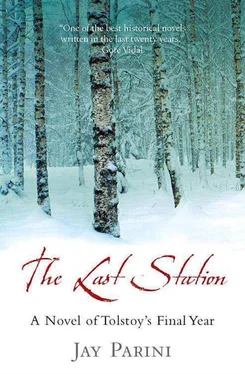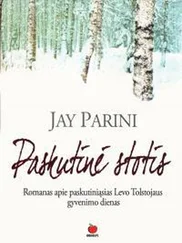The next morning he was greatly improved. His pulse was normal, and so was his temperature. It appeared that he might really survive this crisis and that, soon enough, we’d be in the Crimea or Bulgaria or Turkey – somewhere bright and warm, where Leo Nikolayevich could think and work and pray in unobstructed privacy.
He sat up in bed, remarkably cheerful, chatting amicably with everyone. He wanted to discuss the various projects under way, and we did so for nearly an hour. He had not lost interest in the world.
Sasha asked him about God, thinking that during his delirium he might have realized something different from what he has always thought. Inwardly, I scoffed at her. But he was kindly, as ever, and answered her query with his usual directness. ‘God is the eternal whole of which each person represents a tiny part. We are the manifestation of Godness in time, in space, in matter.’ She wrote this down, as did I.
Leo Nikolayevich raised a finger. ‘Another thought for you, Sasha. God is not love, but the more love there is in man, the more is God made manifest in him, and the more truly does he exist.’
‘Doesn’t this make the existence of God arbitrary?’ I asked him.
He shook his head. ‘Nothing is arbitrary.’
I thanked him for his statement.
We reminded him that he had asked for Chertkov the night before, and he grew anxious about how Sergey and Tanya would feel about this. He asked Sasha to write the following:
Please do not hold it against me that I have not summoned you along with Chertkov. You know that he bears a special relation to me, having devoted his life to the cause I, too, have served for much of forty years. That cause is dear to me, and I strongly bold it to be essential for all men, including you both… Farewell. Try to comfort your mother, whom I love sincerely.
‘You may give them this note after my death,’ he said, when suddenly he began to weep. It was most unlike him.
All day, Ozolin’s three young children played in the next room, sang songs, whistled, and shouted. A delightful smell of boiling cabbage issued from the kitchen, with much clanging of pots and laughter. I worried that this would disturb Leo Nikolayevich, but he said he liked the commotion and told me not to disturb them. ‘We are guests,’ he said. ‘We must respect their family life.’
At four, he was overtaken by chills. He crawled back beneath the covers again, a cold sweat on his brow, his jaw quivering. I took his temperature: 103.5. Soon he began to spit bloody mucus into a pan.
I took Sasha aside in the next room. ‘I recommend that we summon Dr Nikitin from Tula. He knows a good deal more than I do about pneumonia.’
‘I should telegraph Sergey,’ she said. ‘He will see that Nikitin gets here quickly.’
Sasha went swiftly to the station, a ghostly whiteness on her face. It is well known that pneumonia is desperately bad for elderly people – or good, perhaps. It’s often referred to as ‘a friend to old men’ because it removes them from the scene of present misery.
I sat up beside Leo Nikolayevich all night, taking his pulse and temperature at intervals. It was torturous. He had an unquenchable thirst, and he cried out several times to God to ask for death. He was like an old ship beating through a storm, its straking loose, sails torn, the bowsprit broken.
I was relieved when dawn came and Leo Nikolayevich was alive. I took myself outside for a breath of air while he snored, having fallen into a deep sleep at last. I felt exhausted, too, with cramps in my intestines. I held on to the railing to avoid toppling over.
The station was empty at that hour. As I sat by myself on the platform, I studied the silvery tracks that trailed off into infinity. It occurred to me that the life of the body and the life of the soul are like these tracks, running parallel into the visible future. We like to imagine a meeting point, a junction where the earthly body joins a heavenly one. But this is an illusion. The body rail, somewhere, at a definite point in time, stops. The spirit rail continues, perhaps to infinity. Who can say?
Kneeling at the bench, I prayed for the Tolstoy family and for my own soul. And I felt, deep inside me, that I was not alone.
When Leo Nikolayevich woke, an hour later, he took his own temperature. It was 104.3.
‘Not a good sign, Dushan,’ he said.
‘You’ll be all right,’ I said.
‘You needn’t lie to me, my friend,’ he said. ‘But I understand how you must feel. Remember that you are my doctor, not my angel. Whatever happens, it is not your fault.’
A fit of coughing took him by surprise, and he shook violently. I gave him a glass of water.
‘All will be well,’ he said. ‘You are quite right.’
I looked at the floor. It was foolish of me to address him like a child.
‘This is it,’ he said. ‘Checkmate.’
I looked up at him, and he was smiling.
I rejoiced when Leo Nikolayevich left Sofya Andreyevna. Everyone assumed that I was behind his departure, although this was untrue. Reporters from Moscow and Petersburg, from Paris and London, were in touch with me from the outset. But I told them, at first, the truth: I did not know where he had gone. I told them that Tolstoy wanted to escape. He did not want publicity.
But the cause needs publicity. In order to prevent Sofya Andreyevna’s side of the story from dominating the press, I prepared a statement on the reasons for Tolstoy’s flight. For moral consistency, he had no choice but to leave, it explained.
The telegram from Astapovo, which requested my presence, moved me terribly. I was breathless and strangely elated now. My work had not been in vain.
I left at once, arriving on Tuesday in the little railway station, having traveled through the night to his bedside. Sergeyenko accompanied me.
My heart leaped when I saw Leo Nikolayevich, the weary, shrunken, but still beautiful face, a blanket drawn up beneath his chin. He was feverish, flushed, and exhausted, but he greeted me with tears and embraces. ‘It is you!’ he kept repeating. ‘I can hardly believe you’re here, at last. Thank you, Vladimir. Thank you.’
The stationmaster asked if I was his son.
Leo Nikolayevich nodded eagerly. ‘He is my son,’ he said. ‘I have no other son who has understood.’
We drank a glass of tea and talked about his departure from home. The business of Sofya Andreyevna is all quite impossible. Being out of her mind, she would pounce on us as soon as she learned of her husband’s whereabouts. That much was certain.
‘I don’t know when she’ll come,’ Leo Nikolayevich said. ‘But she will come. I know it.’
‘She will not bother you,’ I said.
He seemed to relax when I said that, and I determined to keep her away from him. She will not make his death a miserable one.
As I feared, we did not have to wait long for the wretched woman. Sometime in the early afternoon Ozolin appeared and asked Sasha and me to step outside. Leo Nikolayevich was dozing, luckily.
‘A telegram has come from Tula,’ he said. ‘The Countess Tolstoy has hired a private train, a first-class train! She will arrive in Astapovo after dinner.’
At once I called everyone together in the waiting room of the station: Sasha, Varvara Mikhailovna, Dushan, Sergeyenko. All agreed that Sofya Andreyevna must not be allowed to see her husband. In his condition, it would kill him.
‘Mama would drag him back like a sack of beans, dead or alive,’ Sasha said.
‘We must form a protective circle around the stationmaster’s cottage,’ I said. ‘Sofya Andreyevna, and her dreadful offspring – I refer to the odious ones, Ilya and Andrey – must be prevented from invading his sickroom.’
Читать дальше












